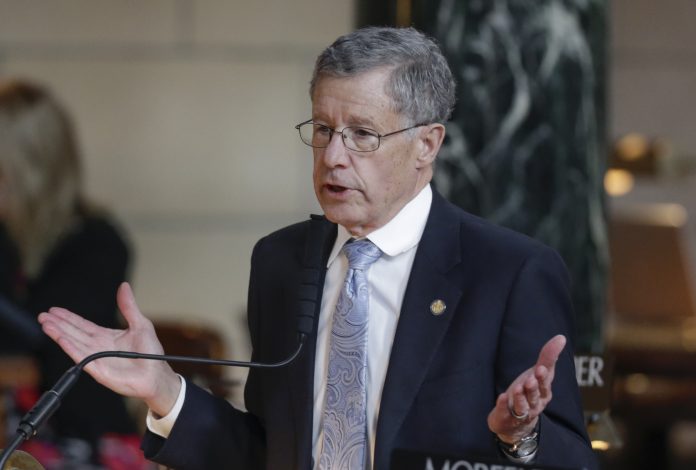
Nebraska state Sen. John McCollister was disappointed but not terribly surprised when he read a press statement that the state Republican Party wanted him out.
McCollister, a Republican for five decades, gained national attention Monday when he blasted party officials for “enabling white supremacy ” following this weekend’s mass shootings in Texas and Ohio, and allowing President Donald Trump to “hijack” the GOP platform.
He joins a group of elected officials who have either left the GOP or been ostracized by party leaders after publicly criticizing the president and Republicans who support him. In a press release Monday night, the Nebraska Republican Party urged McCollister to “tell the truth about his partisan views” and register as a Democrat.
“We’re apparently not the party of the big tent anymore,” McCollister said Tuesday. “It’s become so mean-spirited. Perhaps my view is aspirational, but I think we ought to be the party of big ideas and effective government. I don’t think the party should be as close-minded as it appears to be.”
McCollister said he doesn’t intend to leave the Republicans, unlike other current and former officials who have crossed the party.
U.S. Rep. Justin Amash of Michigan changed to independent last month after becoming the only Republican member of Congress to accuse Trump of impeachable conduct. He now faces three Republican challengers in his conservative district, which he has represented since 2010. After he switched, Trump blasted him on Twitter as “one of the dumbest & most disloyal men in Congress.”
Other congressional Republicans critical of Trump have recently announced their retirements, although they gave other reasons for leaving office.
U.S. Rep. Will Hurd of Texas, the only black Republican in the House, announced last week that he won’t seek re-election in 2020 . Hurd was one of the only Republicans to condemn Trump’s comments that four liberal, minority congresswomen should “go back” to their countries of origin, even though all four are U.S. citizens and three were born in the United States.
Another Texas Republican who is retiring , U.S. Rep. Pete Olson, was among the first GOP lawmakers to condemn Trump’s tweet about the congresswomen as “not reflective of the values” in his suburban Houston district.
Nebraska has seen many party-switchers.
Former state Sen. Bob Krist left the GOP in 2017 and ran unsuccessfully for governor as a Democrat, pledging to govern as a centrist. Former state Sen. Laura Ebke switched her registration from Republican to Libertarian in 2016 after Gov. Pete Ricketts issued a call for more “platform Republicans” at the state GOP convention.
Brad Ashford abandoned the GOP in 2011 to become an independent, then re-registered as a Democrat during his 2014 campaign for Omaha’s 2nd Congressional District. He won, but lost the seat two years later.
Ebke said she left because Republican officials weren’t open to her libertarian beliefs, even though she voted as a conservative on most issues and occasionally sided with Democrats. She also grew uncomfortable with Trump’s hostile rhetoric.
“I was concerned with the direction the party was going,” said Ebke, who lost her legislative seat to a Republican last year. “The parties are becoming less friendly to those who dare to think like the other side on some things. There’s a limit to how much you’re willing to get beat up by people who are supposed to be on your team.”
Nebraska Republican Party Executive Director Ryan Hamilton said he wasn’t worried about the recent defectors because many served in relatively minor roles compared to Ricketts, a staunch conservative, and Nebraska’s all-Republican congressional delegation.
“The people who are leaving are not necessarily the high-impact folks,” he said.
Hamilton said the party’s criticism of McCollister was justified because he has repeatedly voted with Democrats in the officially nonpartisan Legislature and spoke at a rally organized by abortion-rights supporters. Hamilton said many party activists were insulted by McCollister’s tweets and don’t consider him to be loyal to their core beliefs.
“Are we a big enough tent to handle dissent on policy issues? Absolutely,” Hamilton said. “Are we able to handle votes that are out of line with the platform? Yes. But to say the party is enabling white supremacy is abhorrent. You have to have good faith in the colleagues you’re in the tent with.”q
___















